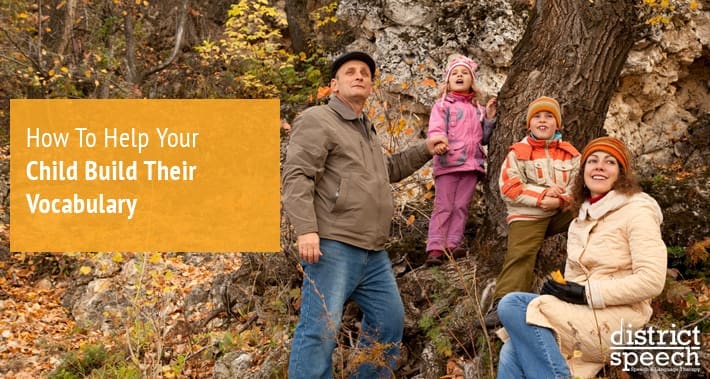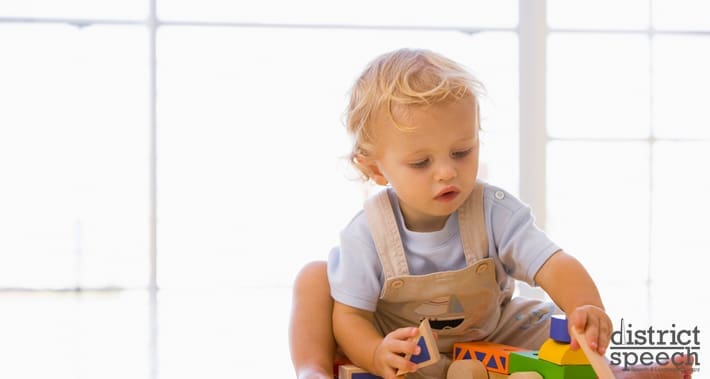
As you watch your child develop and grow, you measure progress through milestones such as their first smile, first steps, or first words.
But what if you start to notice that they are not developing as quickly as their peers?
There are particular signs that can indicate if your child has a speech or language disorder.
At District Speech we provide learning disabilities speech therapy for children of all ages.
The first time you bring your child in, we’ll conduct a thorough evaluation to understand exactly where they are currently at, and create a tailored treatment plan to help catch up.
Perhaps your child has not yet started to talk, but all the other kids their age are speaking?
As toddlers, every child develops at their own pace.
Learning to talk can vary greatly from one child to the next.
But if you find your child is struggling to communicate, there are ways that you can help them.
Be sure to consult with a pediatric speech therapist though, since early intervention speech therapy when dealing with childhood speech disorders can give your child the best chance at developing effective speech and communication skills.
Let’s have a look at some of the methods you can use to help your child to develop vocabulary as they learn and grow.
What Is Vocabulary?
Vocabulary describes the number of words we understand that help us to communicate effectively.
It plays a fundamental role in development, whether through listening, speaking, reading, or writing the words we know and understand.
There is a close relationship between vocabulary and knowledge that make it so important for your child’s growth.
This is because building vocabulary is one of the main focuses of education, as children are measured by their reading comprehension and ability to use and understand words as they progress.
How Can You Help Your Child Build Their Vocabulary?
If you find that your child becomes frustrated when trying to communicate, they may need help building their vocabulary.
As a toddler develops, play is an essential part of the learning process.
Recent studies support the great benefits of using play to build vocabulary.
Let’s explore some of the ways to help your child practice their language skills through play.
1. Act Things Out With Them
There are many benefits of reading to your child.
First of all, it’s a great way to introduce new words and concepts into their vocabulary.
Try taking a scene from the book you’re reading and acting it out together.
This will help your child understand the concepts being introduced to them and facilitate them adding new words to their vocabulary.
Watching you do something encourages your child to do it on their own, using the new words they have learned.
By speaking the words while doing the actions, your child will adopt them into their own vocabulary.
2. Give Them A Variety Of Different Toys
Different types of toys encourage children to use different types of language.
All children have their favorites, but introducing new toys is another way to help your child learn new words.
For example, a child playing with a toy truck can learn words for a variety of vehicles and transportation methods.
If your child likes to play with toy animals, teach them the words for the various sounds the animals make, as well as the places they like to live.
Applying vocabulary to different play situations helps your child to place new words in context and better understand their meanings.
There are also lots of apps out there that can be educational and instrumental for your child’s development that can supplement physical play.
Some apps we recommend are:

3. Give Them A Robust Social Life
Your child can practice their language skills by playing with their peers.
Don’t limit play dates only to children of the same age, as exposing your child to a variety of different social groups means they will take on different roles within each group.
If they are the youngest child, they have the opportunity to learn new words from older children who probably have a much larger vocabulary than they do.
Playing with younger children allows your child to take a leadership role and teach the younger kids at their own pace.
Both situations allow your child to practice the communication skills they have learned in different ways.
4. Use Words Related To Their Senses
Sensory play is another way to help your child develop their language, as words describe the things that they see, hear, feel, taste and smell.
You can plan sensory activities such as exploring in a sandbox, playing with playdough, or water activities like bubbles.
But it doesn’t have to be that formal.
Ask your child to describe their environment using sensory words or play games that allow them to use their senses, such as “I Spy”.
Making connections between words and senses helps your child to learn faster and understand the meaning of the words in context.
5. Explore With Them And Let Them Explore On Their Own
Help your child develop a greater vocabulary by exploring the world around you.
Explore new places to expose your child to new words and new ideas.
Visit the zoo to learn the names of all the animals, or a science center or art gallery to allow your child to play with things they haven’t seen before.
Walk in the woods, identifying the trees, birds, insects and other things around you.
Immersing the child in an activity allows them to learn through play, and when you get home, you can bet they will have many new things to talk about.
Playing one on one with your child illustrates to them how to interact with their environment, but it’s also important to let your child play on their own.
When your child has time to practice language on their own, they rely on their imagination to guide them.
Imaginative play is another excellent way to grow and learn.
Book Your Appointment With District Speech Today
While your child develops, you get to witness their growth and development as they learn to communicate in new ways.
A parent knows best.
If you think your child is experiencing issues with communication, our Washington DC speech therapists can help.
It’s very important to understand that early intervention is key, for children with a learning disability.
This way, they’ll have less time to build bad habits going forward.
Plus, those bad habits are typically easier to correct when caught early.
Book your appointment with District Speech today.
1300 I St NW, Suite 400 E,
Washington, DC 20005
- https://g.page/districtspeech
District Speech and Language Therapy specializes in speech therapy, physical therapy, and occupational therapy solutions, for both children and adults, in the Washington D.C and the Arlington Virginia areas.